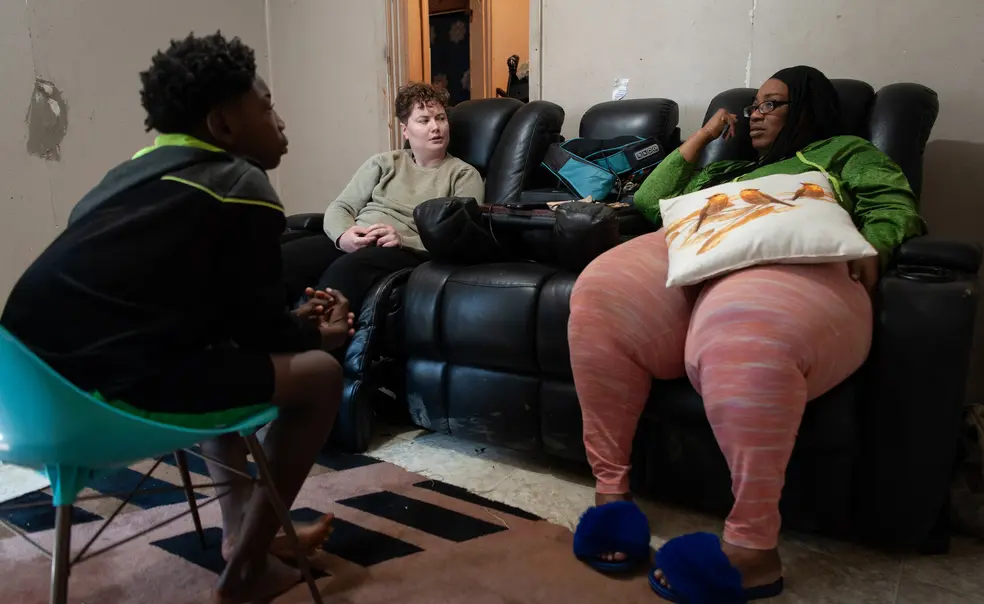How I Exposed a Sewage Crisis in Mississippi With Help From Neal Peirce ’54
Stephanie Smith opened the door to her bedroom closet and reached for a teetering tower of cardboard boxes, desperately hoping one of them contained medical results she’d received months earlier, showing whether she’d tested positive for parasitic worms.
It was the last day of my Mississippi Delta reporting trip funded by the Neal Peirce Foundation, named after a Class of 1954 alumnus who dedicated his journalism career to telling under-told stories of municipal problems and solutions across the U.S.
Starting in the 1970s, Peirce traveled around the country to meet with local leaders and write about what made their transit, housing, and downtowns function. He lived in Washington, D.C., but spent two weeks every month on the road. Peirce looked at regions holistically and appreciated what made them culturally unique. His Peirce Reports outlining personalized recommendations to improve metro areas such as Charlotte, North Carolina, and the state’s Research Triangle became celebrated after his death.
Last year, editors at USA Today encouraged me to apply for a travel grant given to eight journalists annually and established by Peirce’s family after his death in 2019. I had been trying to wrap my head around my project for over a year, and had never been to Mississippi.
It started in December 2022 when I received a tip about a scientific study that found 38% of children tested in Shaw, Mississippi, were found to be infected with worms and single-cell organisms linked to fecal-contaminated water and soil.
I was eager to highlight the news, but the story was so complex, and I struggled to devote the necessary time to it while writing national breaking news, viral internet stories, and pets coverage for USA Today. Everyone in the newsroom was under tremendous pressure, made worse by the threat of layoffs, to publish stories that capitalized on search trends.
Editors recognized the Mississippi study was powerful, so much so that I’d need to travel there to do it justice. I made the case to the Neal Peirce Foundation in an application highlighting how I’d been learning about the issue for months. When I heard back, a foundation member told me the board was unanimous in its decision to award me a travel grant, and nearly two years after learning of the study, I got the cash needed to move forward.
Three months later, I joined the Boston Globe, also as general assignment reporter, and got the green light from editors to travel to Mississippi.
Getting the story
Smith lives in Shaw, a town in the northwest corner of the state that has a population of less than 2,000, 95% of whom are Black. The region has some of the most fertile soil on Earth and is known for being a floodplain. However, the rising waters can cause sewage to back up into people’s lawns instead of draining toward a treatment facility on the edge of town, according to city documents.
I needed to find residents who participated in the study and tested positive for worms.
But the scientific study authors — a pair of anthropology professors who collected and tested stool samples — could not share the participants’ identities, as they were restricted by Washington University in St. Louis’ rules protecting human research subjects.
Driving on the Blues Highway into Shaw on the night of Sunday, March 9, I could see lampposts and lit-up windows of homes slung across the western horizon, while my windshield wipers fought against rain. The next morning, I began knocking on the doors of those homes.
This is where I became the investigative reporter Princeton journalism professors taught me to be. After connecting with Smith, I knocked on doors, hunted for documents, and filed public records requests to get all the information I could about her health problems and her peaceful hometown’s wastewater contamination crisis.
Smith unearthed a letter from the Washington University researchers who tested her stool sample in 2024. The letter said she tested positive for a bacterial infection of the stomach lining — not worms, which she would learn about through a separate test that was still being processed.
I felt defeated.
Then I took a step back. I would make do with what I had, I told myself, grateful that Smith had let me, a stranger, dig through her personal belongings as if searching for a golden ticket.
I reminded myself that her stool sample test result, showing researchers had circled the word “positive” next to her anonymized study ID number, was in fact a breakthrough. No other reporting published on the scientific studies featured a Shaw resident who had tested positive for the stomach and intestine infections researchers say are intrinsically linked to poverty, race, and the environment.
With Peirce’s legacy in mind, I also focused my story on the town’s mayor, planned sewer infrastructure improvements, and how more federal grants are needed to protect Shaw residents from the environmental effects of flooding.
While searching for people’s health records left me feeling exasperated, reporting on sewage complaints and federal grant application paperwork grounded my story in the kind of municipal journalism I hope Peirce would be proud of.
Claire Thornton ’19 is a reporter for the Boston Globe. Read her article on Shaw and learn more about the town and other data about parasitic worms across the U.S. Also, see aerial photos and hear from Shaw doctors and nonprofit staff at Delta Hands for Hope.












No responses yet